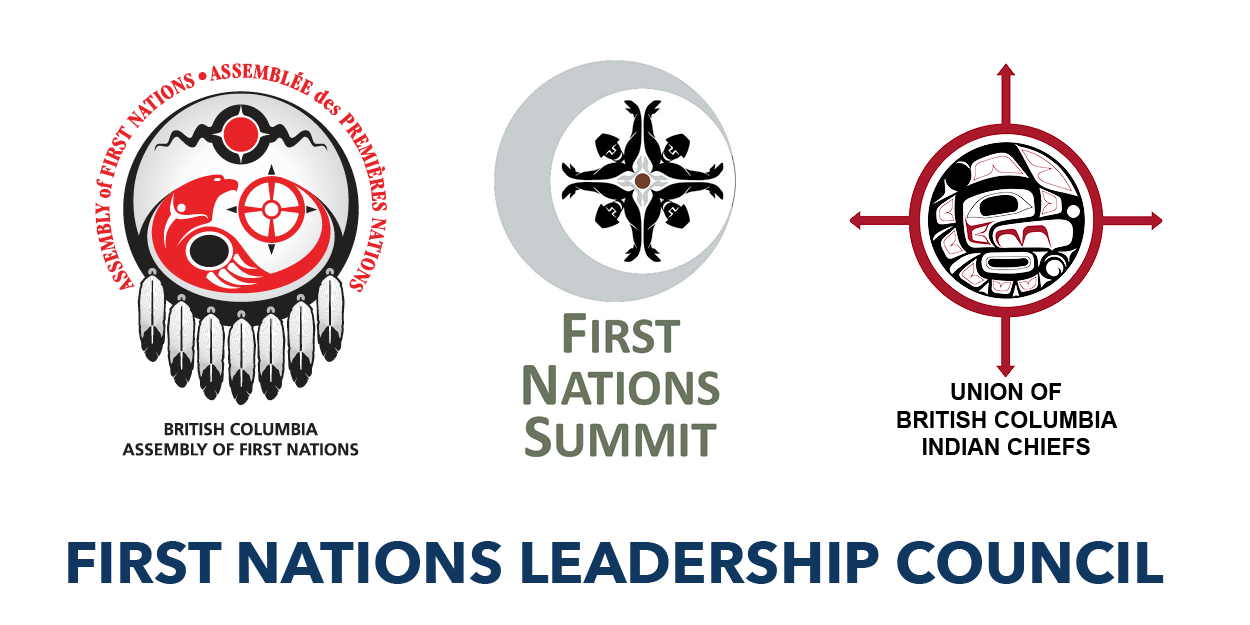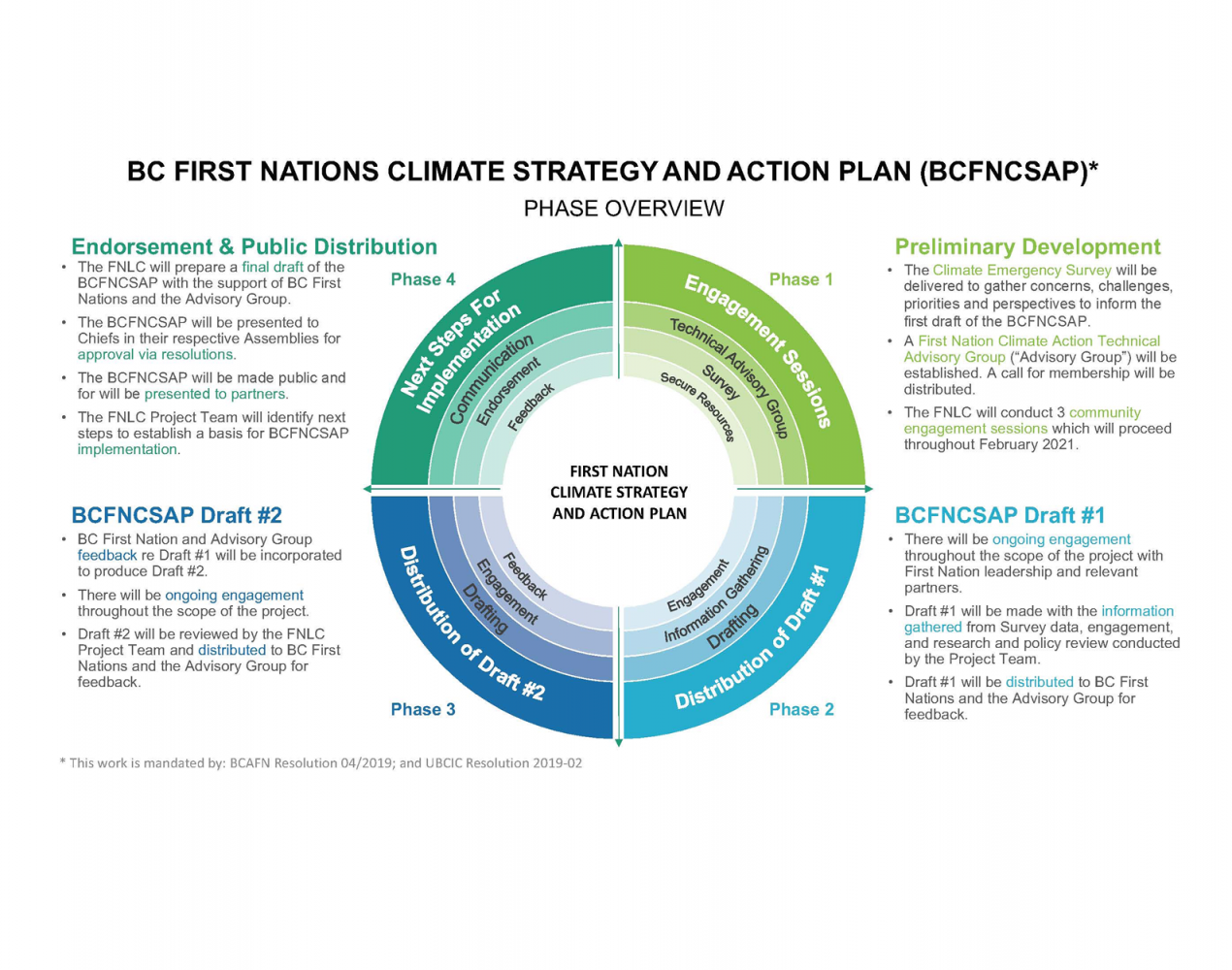
The First Nations Leadership Council (“FNLC”), as mandated by the Chiefs in BC (UBCIC Resolution No. 2019-02, BCAFN Resolution No. 04/2019 and FNS Resolution No. 0221.15), is developing a First Nations Climate Strategy and Action Plan (“Strategy”) which will be informed by First Nation priorities and knowledge.
The objective of the Strategy is to identify strategies and actions to reduce greenhouse gas emissions, to strengthen Indigenous climate leadership in BC, to reduce vulnerability to impacts, and to build capacity, understanding and resilience in First Nation communities. The Strategy is intended to help guide climate responses while also communicating to governments and partners of priority areas. This will, in turn, remind governments and partners that successful climate action is possible only when co-created with First Nations in ways that protect and strengthen Title, Rights, and jurisdiction, and when Indigenous Knowledge and unique connections to territories are respectfully acknowledged and thoroughly incorporated in all aspects of climate planning and action.
To begin the strategy's development, the FNLC hosted a Climate Emergency Survey (the “Survey”) in August and September of 2019. The Survey identified First Nation perspectives on impacts, concerns, barriers and priorities regarding climate change. Participation in the Survey came from 139 First Nations and Tribal Councils across all eight regions of British Columbia. A total of 244 people began the questionnaire, of which 221 completed it, including 54 Chiefs and Councillors, 9 technicians, 10 Elders, 108 members and 40 responses from staff members working for First Nations. The data from this survey will inform the strategy's first draft and further development.
Development Plan
With the support of the Province of British Columbia, since December 2020 the FNLC has been undertaking a process to develop the Strategy. A final version of the Strategy is expected to be completed by summer 2021 which will then be presented to Chiefs in their respective FNLC Assemblies for approval between September and October of 2021. The development of the Strategy has four phases as further described in “Figure 1.0” and as follows:
Phase 1: Preliminary Development: Preliminary development, including drafting and distributing public notices regarding the Project, convening and establishing a First Nations Climate Action Technical Advisory Group (“Advisory Group”), and preparing for community engagement sessions, will be conducted between December 2020 and January 2021.
Phase 2: Draft #1: The FNLC will prepare an outline, which will include a vision, guiding principles, goals and objectives of the Strategy. The outline will be reviewed by the Advisory Group and will serve as an introductory document for the community engagement sessions. A first draft will then be prepared with the information gathered from engagement, survey data, as well as policy review and research conducted by the FNLC Project Team. The first draft of the Strategy will be finalized by March 2021 and will be shared with the Advisory Group for review and comments.
Phase 3: Draft #2: Feedback provided from the first draft will be incorporated to prepare a second draft. The second draft will be presented to First Nation leadership, staff, organizations, and experts and will be open to comments and feedback. A second draft of the Strategy will be finalized by early summer 2021 and will be shared with the Advisory Group for review and comments.
Phase 4: Endorsement and Public Distribution: A final version of the Strategy is expected to be completed by August 2021. The final version will be presented to Chiefs in their respective FNLC Assemblies for approval via resolutions between September and October of 2021. Once endorsement is complete, the Strategy will be publicly distributed and presented to partners. Simultaneously, the FNLC will be collaborating with government and partners to identify actions for implementation.

Engagement Approach
A critical part of the FNLC’s mandate includes engagement with First Nations in British Columbia as well as key First Nation groups and relevant partners.
First Nation Climate Action Technical Advisory Group (TAG)
As part of the preliminary development phase, the FNLC will convene and establish a First Nations Technical Advisory Group to assist in the development and delivery of the BC First Nation Climate Strategy and Action Plan. This includes reviewing and providing feedback on the first, second and final drafts of the Strategy while also liaising with the FNLC and other relevant partners on an ongoing basis. A Call for Expression of Interest for Advisory Group membership, including the Terms of Reference, will be distributed in early January 2021. The TAG will be established in February 2021.
Community Engagement Sessions
The FNLC conducted regional community engagement sessions to inform the Strategy. These sessions will be held on February 5, 12 and 16, 2021. During the two-hour virtual sessions, participants received background information regarding the Project and will discuss First Nation priorities on greenhouse emissions reduction and climate adaptation initiatives. By way of information sharing, these sessions also supported First Nations in developing their own strategies and plans to implement responses to current and projected climate issues. Another round of community engagement sessions will be held in late spring/early summer to present the draft of the strategy, including a youth engagement session.
Engage with First Nation organizations.
The FNLC will engage with First Nations organizations operating within BC to determine what climate initiatives may already be completed, in progress, or contemplated in the near future. An online questionnaire will be sent to First Nations organizations in March 2020 concerning organization’s mandate and its relevance to climate mitigation and adaptation. The data collected in this questionnaire will be used to inform the Strategy and identify opportunities to develop institutional capacity for climate action.
Individual Meetings
During the development of the Strategy, the FNLC has been also providing the opportunity for individual, one-on-one meetings with First Nations leadership and/or staff who cannot attend the engagement sessions or prefer this form of engagement. This opportunity is available throughout the entire development of the Strategy.
The FNLC will be also engaging on an ongoing basis with, among others, First Nation organizations, First Nation leadership, staff, traditional knowledge keepers, academics, and experts.
COVID-19 Provisions
COVID-19 introduced sudden impacts to Indigenous peoples around the world, including First Nations in BC. As such, the development of this Project has been adjusted to reflect the current context of this pandemic. To uphold the PHO orders and ensure the safety of all, the FNLC has restricted travel and has transitioned all in person meetings, gatherings, and engagement initiatives to a virtual meeting space. This includes any All-Chief’s Meetings hosted by the BC Assembly of First Nations, the First Nations Summit, and the Union of BC Indian Chiefs.
If COVID-19 cases continue to rise, it may be required to postpone currently scheduled engagement initiatives as well as the Project’s Community Engagement Sessions. As a result, Project development and delivery will be delayed. Please note that the content within this Development Plan is subject to amendment in this regard,
Project Team
The Project is being led by a Project Team composed of technical representatives from the FNLC organizations and with the coordination from a Project Manager.
BCAFN technical representatives:
UBCIC technical representatives:
FNS technical representative:
FNLC Project Manage:
First Nation Climate Action Technical Advisory Group
As part of the development of the BC First Nations Climate Strategy and Action Plan (the “Strategy”), the FNLC convened and established a First Nations Climate Action Technical Advisory Group (“TAG”). Plan A Call for Expression of Interest for Advisory Group membership was distributed in early January 2021.
The TAG is composed of 10 members with diverse regional representation with the inclusion of First Nation Elders and/or Knowledge Holders, youth and women. TAG members hold expertise in areas of climate change and Indigenous Knowledge that spans a variety of sectors and areas. Each TAG member brings knowledge, values and understandings to the table based on their range of experiences.
The purpose of the TAG is to act as an advisory body to the First Nations Leadership Council to support the development and delivery of the Strategy. This includes:
- Reviewing and providing technical expertise on the Strategy’s development plan and engagement approach with First Nations in BC;
- Reviewing and providing feedback on draft Strategy documents such as an outline, vision, guiding principles, strategies and actions, etc.; and,
- Assisting in the delivery of the Strategy through discussions around implementation.
The TAG members are as follows:
- Aaron Coelho - biography
- Andrea Reimer - biography
- Edna Boston
- Heidi Martin - biography
- Hugh Braker
- Michael Vegh - biography
- Serena Michell-Grenier - biography
- Steven Brown
- Tannis Reynolds
- Albertina Erickson - biography
Communications documents
List of communication documents distributed to First Nations in BC:
FNLC letter
BCAFN First Nations Climate Strategy and Action Plan Graphic Overview
Development Phase Illustration
Save the Date - Community Engagement Sessions
Technical Advisory Group - Call with TOR
Community Engagement Sessions – Flyer
Technical Advisory Group Flyer
Information shared at the BCAFN Special Chiefs Assembly (March 2021)
BC First Nations Climate Strategy and Action Plan
Briefing Note: BC First Nations Climate Strategy and Action Plan Update
